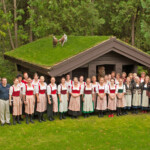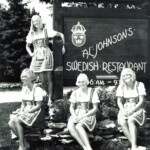(MAY 2019) — What does it take for an ethnic Wisconsin restaurant to stay in business for 70 years and also be incredibly successful for most of that time? By all accounts, it’s simple: service, service and service. That’s the key recollection of the four family members who own and operate Al Johnson’s Swedish Restaurant & Butik in Sister Bay, where a first generation owner, Ingert Johnson, and her three children, Annika, Lars, and Rolf, have announced that 2019 is the business’s 70th anniversary.
“My dad started Al Johnson’s in a former IGA grocery store in 1949,” said Rolf Johnson recently. “He always said his intention was to put Sister Bay and Door County on the map, and I think he succeeded in that.”
Born in Chicago, Al Johnson was born in 1925 at Swedish Covenant Hospital. Al’s parents had first arrived in America in 1920 and lived on the north side of Chicago. When Al was seven years old, in 1932, he and his sister Mildred, who was several years younger, traveled alone back to Sweden to visit relatives. The next summer the two youngsters again traveled alone, this time to Door County, Wisconsin, because “my grandparents wanted to keep the kids off the Chicago streets,” said Rolf Johnson. The seven-year-old Al and five year old Mildred stayed with relatives in Sister Bay for the entire summer, where they picked cherries and strawberries in the fields that surrounded the village at the time. “The pickers back in those days were all Swedes,” said Rolf.
After three years of service during WWII with the U.S. Army’s 101st Airborne Division, Al Johnson was an athletic high school graduate who started college at Marquette University with the intention of studying law enforcement. He had worked during college at a local F.W. Woolworth “five-and dime store,” where he was introduced to the chain’s practice of not using food tickets, but instead had servers call in their orders directly to cooks in the kitchen. Al Johnson’s would later adopt the practice and is presently one of the few restaurants in the U.S. that doesn’t use food tickets or an electronic ordering system for its servers. Lars Johnson noted, “I can’t tell you how many consultants have come in here with the idea of selling us an expensive, computer-based point-of-sale ordering system. After they see how smoothly our dining room and kitchen operate, they always say the same thing, “Don’t fix what already works.”
Working in Sister Bay for a spell, Al found Sister Bay’s IGA Store for sale and quickly made the decision to drop out of college, borrow a down payment from his parents, and purchase the store in order to create his own casual diner. He then bought out the interest of his early partner after their first year in business together and returned to Marquette to finish college. There were several lean years at the beginning, in a county that hadn’t yet turned into the major tourism destination it later became. For one thing, Sister Bay was almost completely dead during the long winters. Al had to be convinced several times by his parents to tough it out and slowly build the business, but it eventually happened, as Al slowly adopted the family’s Swedish recipes and even had his mother hand-rolling meatballs in the kitchen…until the day a traveling salesman brought in a newfangled mechanical meatball-maker and offered to leave it in the restaurant’s kitchen for a week. Al’s mother fell in love with the modern machinery and told her son, “You’re not sending that back,” Rolf fondly says today.
In 1959, Al Johnson met his future wife, Ingert Forsberg, a similarly independent spirit from Sweden who traveled alone to the U.S. to work at a popular Chicago resort and restaurant. Ingert loved America and discovered the existence of Door County from a co-worker. She soon visited the Door Peninsula with her friend and found season-long employment at Gordon Lodge in Baileys Harbor, where she was working when she met Al Johnson. The two became engaged and were married in 1959, traveling throughout Europe on their honeymoon. When they returned, Ingert was quickly brought into the restaurant operations as a server, but also convinced Al they should be selling lingonberries and Swedish clogs at the restaurant’s cashier station. The gambit was a quick success, leading to the purchase of a small home next door that was turned into Al Johnson’s first retail store, the Butik. The initial products sold in the Butik were largely imports from Sweden, and Al always credited his wife for diversifying the restaurant’s business, a critical factor in its overall success over the years.
Al Johnson’s became famous as “The Place with the goats on the roof” starting in 1973. Al and his friend Wink Larson had traded joke birthday gifts for many years when, in an oft-repeated anecdote, Wink presented Al with a full-grown goat. Wink climbed up a ladder to put the goat on the sod-covered restaurant sign, fell down and broke his collarbone when the goat leapt from his arms…and the rest is history. According to the Door County Visitor Bureau, one of the top five questions their staff receives at the Door County Welcome Center is “Where’s the place with the goats on the roof?” And, the Visitor Bureau notes that Al’s (or “The place with the goats on the roof”) is also the most-asked-about restaurant in Door County.
Al Johnson’s Swedish Restaurant & Butik has received significant plaudits and awards over the years, many honoring the business’s unique vision, excellent customer service, and other qualities. In April 2017, the business was awarded a Travel Green Wisconsin designation in recognition of its commitment to environmentally-friendly and sustainable business practices; that same month, the Door County Economic Development Corporation awarded Al Johnson’s its annual “Entrepreneur of the Year” award in recognition of the company’s “blend of innovation and historic nostalgia.” In November 2018, Al Johnson’s received a major award from Rubicon Global as the “Best Small Business in America.” Most recently, in March 2019, the business was presented with the Governor’s Tourism Award for Service Excellence by Wisconsin Governor Tony Evers for having achieved “significant success and growth by providing exceptional service to their customers and a strong, charitable involvement in their community.”












